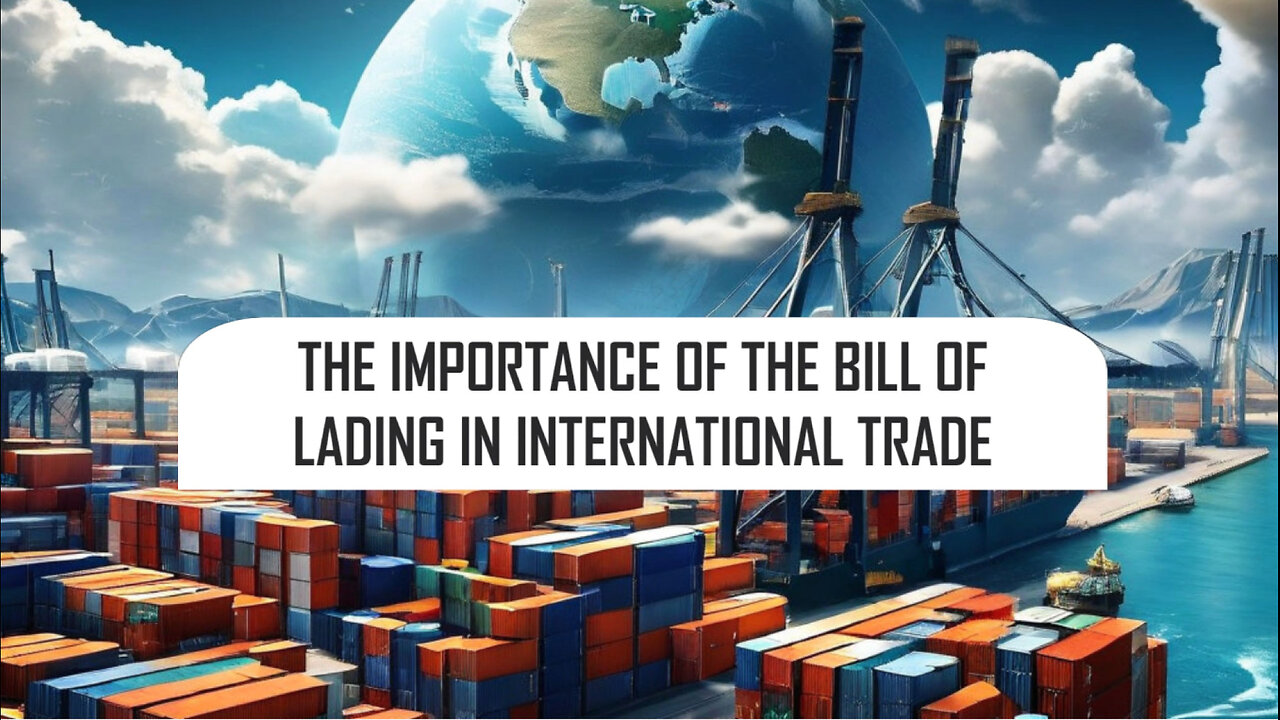Premium Only Content

Unveiling the Importance of the Bill of Lading in International Trade
ISF Checklist || 805-970-7918 || contact@isfchecklist.com || www.isfchecklist.com
The Bill of Lading (B/L) is a crucial document in the shipping industry that serves as a contract, receipt, and document of title for goods being shipped. It acts as proof of shipment, demonstrating that the cargo has been loaded and the carrier has agreed to transport it to the specified destination. The B/L also serves as a document of title, allowing the holder to take ownership of the goods upon presentation, protecting the interests of both the buyer and the seller. Furthermore, customs authorities require a Bill of Lading to process imports and exports, as it provides essential information about the goods and helps assess duties and taxes accurately. Key information typically included in a B/L includes the shipper and consignee, description of goods, shipping route, and freight charges and payment terms. Different types of B/Ls serve specific purposes, such as a straight B/L, order B/L, and charter party B/L. Understanding the significance of the Bill of Lading is crucial for anyone involved in international trade, as it plays a critical role in shipping, customs clearance, and the transfer of goods' ownership.
#BillOfLading #InternationalTradeExplained #ShippingDocuments #CustomsBrokerageTips #TradeLogistics #BillofLadingTypes #ImportExportEssentials #CustomsClearanceGuidelines #CargoShipping #GlobalTrade
Video Disclaimer Here: This video is purely educational and has no ties with the US government.
00:28 - Bill of Lading
01:45 - Contents of a Bill of Lading
02:49 - Types of Bill of Lading
03:41 - Understanding the significancce of the Bill of Lading
"
-
 6:25:47
6:25:47
SynthTrax & DJ Cheezus Livestreams
12 hours agoDJ Cheezus & DEF JAM Fight for NY on PS2 - Hip Hop Violence and Vibes (1pm PST / 4pm EST)
42.8K1 -
 2:01:47
2:01:47
Nerdrotic
7 hours ago $10.91 earnedEgypt, Peru and Guatemala Luke Caverns RETURNS! | Forbidden Frontier #082
46.6K8 -
 LIVE
LIVE
Vigilant News Network
7 hours agoFDA Approves Trials for New “Pandemic” Vaccine | Media Blackout
3,819 watching -
 4:06:21
4:06:21
GamerGril
8 hours agoIM THE GREASTEST OF ALL TIME AT.... CHAOS | DAYS GONE
92K10 -
 3:00:18
3:00:18
Due Dissidence
1 day agoTHE PEOPLE VS NATURE by Kevin Augustine - plus a talkback w/ Jimmy Dore
113K10 -
 6:02:06
6:02:06
Rotella Games
13 hours agoMake the Hood Great Again | Day 3 | GTA San Andreas
73K5 -
 2:50:48
2:50:48
PudgeTV
13 hours ago🟡 Practical Pudge Ep 48 with "Willie Faulk" | Catching Up With Old Friends
63.9K2 -
 18:32
18:32
Forrest Galante
1 day ago5 Extinct Animals That I Believe Could Still Be Alive...
168K37 -
 DVR
DVR
Major League Fishing
3 days agoLIVE! - General Tire Team Series: Summit Cup - Day 1
159K7 -
 7:05:23
7:05:23
Hevel Gaming
1 day ago $69.75 earnedNCAAF Tennessee at Georgia While with Heroes of Might and Magic III & Helldivers 2
256K26